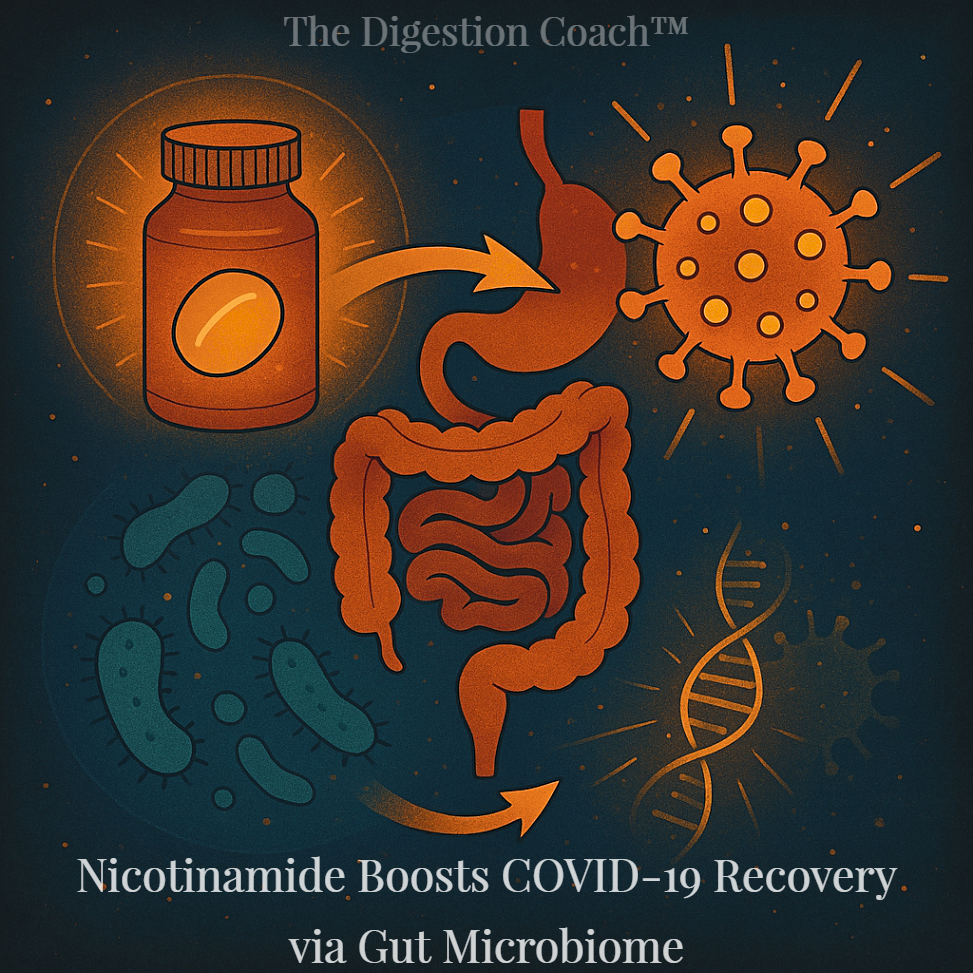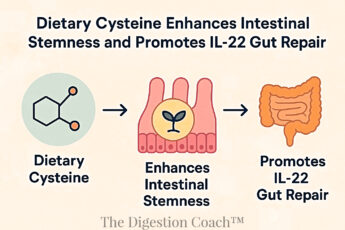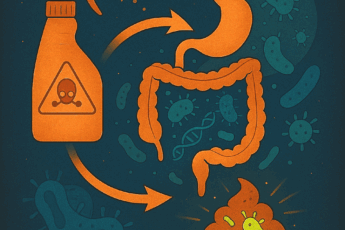Nicotinamide: A Gut-Microbiome-Mediated Strategy for Accelerating COVID-19 Recovery
The COVID-19 pandemic, caused by SARS-CoV-2, has highlighted the need for effective therapies to address its metabolic and immune disruptions. A recent study, Nicotinamide modulates gut microbial metabolic potential and accelerates recovery in mild-to-moderate COVID-19, demonstrated that nicotinamide (aka niacinamide), a water-soluble, non-flush form of vitamin B3, accelerates recovery in mild-to-moderate COVID-19 by boosting levels of nicotinamide adenine dinucleotide (NAD+), a critical molecule for cellular energy, and reshaping gut microbial communities. Nicotinamide is a water-soluble nutrient that serves as a building block for NAD+, a coenzyme essential for energy production and cellular processes like DNA repair and immune regulation. This dual mechanism—enhancing energy metabolism and restoring microbial balance—offers new insights into managing COVID-19 and underscores the therapeutic potential of targeting the gut-microbiome axis.
The Study: Nicotinamide’s Clinical Impact
In a 4-week, prospective, double-blind, randomized, placebo-controlled trial, 900 symptomatic outpatients with PCR-confirmed mild-to-moderate COVID-19 were assigned to receive either a novel nicotinamide formulation (1,000 mg daily) or a placebo. The results were compelling: 57.6% of the nicotinamide group recovered from performance decline by week 2, compared to 42.6% in the placebo group (P = 0.004). Nicotinamide also significantly improved return to normal activities (P = 0.009), with pronounced benefits in patients at risk for severe disease, such as those with elevated baseline inflammation (CRP > 5 mg/L, P = 0.001). These clinical outcomes were linked to favorable changes in gut metagenomic signatures, suggesting that nicotinamide’s effects extend beyond direct metabolic support to include modulation of the gut microbiome.
NAD+ Depletion in COVID-19: A Metabolic Crisis
Nicotinamide’s efficacy is rooted in its role as a precursor for NAD+, which facilitates redox reactions in metabolic pathways like glycolysis, the citric acid cycle, and oxidative phosphorylation. NAD+ exists in oxidized (NAD+) and reduced (NADH) forms, transferring electrons to produce cellular energy. It also serves as a substrate for enzymes like sirtuins, poly(ADP-ribose) polymerases (PARPs), and CD38, which regulate gene expression, DNA repair, and immune responses. These enzymes deplete NAD+ by cleaving it into nicotinamide and ADP-ribose, necessitating continuous synthesis.
SARS-CoV-2 infection significantly reduces NAD+ levels, worsening disease outcomes. Viral replication and oxidative stress increase NAD+ consumption by PARPs, while inflammation upregulates CD38 on immune cells. Additionally, COVID-19 disrupts tryptophan metabolism, a key pathway for de novo NAD+ synthesis. Tryptophan, an essential amino acid, is converted via the kynurenine pathway into quinolinic acid, a NAD+ precursor. In COVID-19, this pathway is skewed toward immunosuppressive metabolites like kynurenine, limiting NAD+ production and contributing to immune dysregulation. See: Microbiota-derived short chain fatty acids: Their role and mechanisms in viral infections
Nicotinamide counteracts this depletion through the NAD+ salvage pathway, a more efficient route than de novo synthesis. In this pathway, nicotinamide, nicotinic acid, or nicotinamide riboside is recycled into NAD+, bypassing the complex processing of tryptophan. By replenishing NAD+ pools, nicotinamide supports mitochondrial function, enhances immune cell activity, and promotes tissue repair. NAD+-dependent sirtuins, for example, reduce excessive inflammation by deacetylating transcription factors like NF-κB, potentially mitigating cytokine storms in severe COVID-19.
The Gut Microbiome: A Pivotal Player
The study’s most innovative finding is the gut microbiome’s role in mediating nicotinamide’s effects. Dysbiosis, or microbial imbalance, is a hallmark of COVID-19, marked by reduced beneficial bacteria and increased pro-inflammatory taxa. This dysbiosis exacerbates NAD+ depletion by disrupting tryptophan metabolism. Bacteria like Clostridium and Bifidobacterium produce metabolites that support NAD+ precursor availability, while short-chain fatty acid (SCFA)-producing bacteria, such as Faecalibacterium prausnitzii, regulate inflammation and tryptophan metabolism. In COVID-19, these bacteria are depleted, correlating with reduced NAD+ synthesis and delayed recovery.
Metagenomic analysis from the trial revealed that nicotinamide supplementation reshapes gut microbial communities, restoring metabolic balance. By week 2, the nicotinamide group showed significant enrichment of Bifidobacterium and Faecalibacterium species, which enhance tryptophan metabolism and SCFA production. By week 4, Akkermansia muciniphila, a mucin-degrading bacterium that strengthens gut barrier integrity, was significantly more abundant (P < 0.05). These microbial shifts were accompanied by upregulated genes involved in nicotinate and nicotinamide metabolism, as well as tryptophan metabolism enzymes like tryptophan 2,3-dioxygenase and kynureninase, likely increasing NAD+ precursor availability for both de novo and salvage pathways.
The restoration of SCFA-producing bacteria also reduced gut-derived inflammation, as evidenced by lower levels of pro-inflammatory cytokines (e.g., IL-6) in the nicotinamide group at week 4 (P = 0.02). This anti-inflammatory effect may enhance NAD+ availability by reducing CD38 activity, creating a positive feedback loop that supports metabolic recovery. The interplay between nicotinamide, NAD+, and the gut microbiome explains the sustained clinical benefits, particularly in high-risk patients with pronounced dysbiosis and inflammation.
A Synergistic Mechanism for Recovery
Nicotinamide’s therapeutic impact in COVID-19 arises from a synergistic mechanism: it directly boosts NAD+ levels through the salvage pathway while fostering a gut microbial environment conducive to NAD+ synthesis. Restored microbial communities enhance tryptophan metabolism, produce NAD+ precursors, and reduce inflammation, amplifying nicotinamide’s metabolic and immune benefits. This dual action accelerates recovery Tháng Năm demonstrated by the study’s clinical outcomes, and positions the gut microbiome as a key therapeutic target.
The sustained benefits of nicotinamide are notable. While direct NAD+ replenishment addresses immediate metabolic deficits, microbial changes ensure long-term resilience by supporting NAD+ synthesis and immune homeostasis. This is particularly relevant for patients at risk for severe disease, who often exhibit significant dysbiosis and NAD+ depletion. The novel nicotinamide formulation (1,000 mg) may enhance bioavailability, contributing to its efficacy, though further research is needed to clarify its pharmacokinetics.
Broader Implications and Future Directions
These findings extend beyond COVID-19, as NAD+ depletion is implicated in aging, neurodegenerative diseases, and metabolic disorders. Nicotinamide and other NAD+ precursors, like nicotinamide riboside, are being explored for their potential to enhance cellular resilience in these conditions. The study’s focus on the gut microbiome opens new research avenues, suggesting that nicotinamide could be combined with probiotics or prebiotics to optimize its effects.
Personalized medicine is a promising frontier. The study’s metagenomic data indicate that patients with specific microbial profiles, such as low Bifidobacterium or Faecalibacterium abundance, may benefit most from nicotinamide supplementation. Advances in microbiome sequencing could enable tailored interventions based on individual gut microbial signatures, maximizing NAD+ restoration and clinical outcomes. Challenges remain, including determining optimal dosing, understanding long-term microbial effects, and validating these findings in diverse populations.
Conclusion
Nicotinamide offers a safe and effective strategy for accelerating recovery in mild-to-moderate COVID-19 by addressing metabolic and microbial imbalances. By boosting NAD+ levels and reshaping gut microbial communities, nicotinamide enhances cellular energy metabolism, modulates immune responses, and promotes long-term resilience. The study’s findings highlight the gut microbiome’s pivotal role in mediating these effects, positioning nicotinamide as a promising therapeutic agent. As research advances, nicotinamide-based interventions could transform the management of COVID-19 and other NAD+-related disorders, paving the way for personalized, microbiome-targeted therapies.










